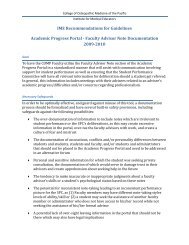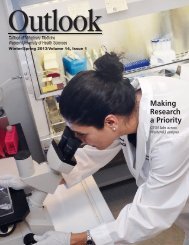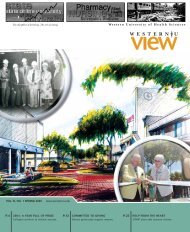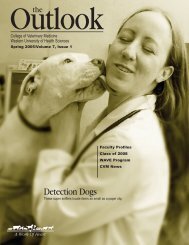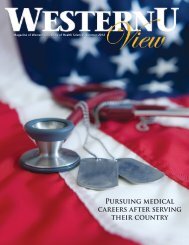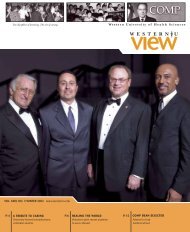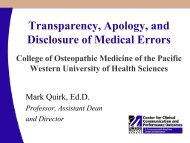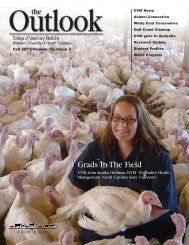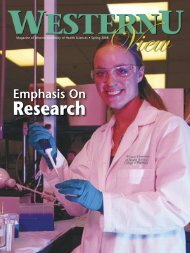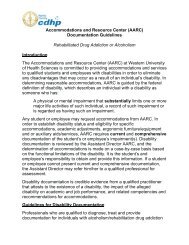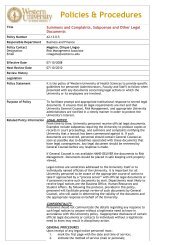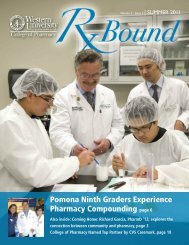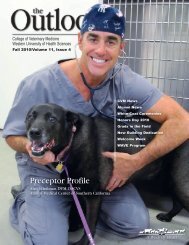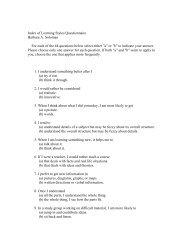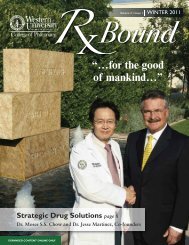Winter 2012 - Western University of Health Sciences
Winter 2012 - Western University of Health Sciences
Winter 2012 - Western University of Health Sciences
Create successful ePaper yourself
Turn your PDF publications into a flip-book with our unique Google optimized e-Paper software.
or the Dentist’s Pledge? Not one<br />
mentions teamwork, collaboration<br />
or working with others to improve<br />
patient care outcomes.<br />
We see interpr<strong>of</strong>essional teams<br />
come together when pandemics or<br />
epidemics place sudden and<br />
intense demands on health<br />
systems. Natural disasters and<br />
humanitarian crises too <strong>of</strong>ten<br />
bring health pr<strong>of</strong>essionals together<br />
in relief efforts. Teams work<br />
together effectively under these stressful circumstances<br />
because they have a common goal and a shared knowledge<br />
and understanding <strong>of</strong> the work that needs to be done. They<br />
may also be working with limited resources and personnel,<br />
forcing them to optimize the skills <strong>of</strong> each team member. If<br />
those are the components <strong>of</strong> high functioning teams, why<br />
don’t we see examples in all practice settings?<br />
In 2010, six pr<strong>of</strong>essional associations came together to try and<br />
answer that question. Participating organizations included the<br />
American Association <strong>of</strong> Colleges <strong>of</strong> Nursing, American<br />
Association <strong>of</strong> Colleges <strong>of</strong> Osteopathic Medicine, American<br />
Association <strong>of</strong> Colleges <strong>of</strong> Pharmacy, American Dental<br />
Education Association, Association <strong>of</strong> American Medical<br />
Colleges and Association <strong>of</strong> Schools <strong>of</strong> Public <strong>Health</strong>. These<br />
six participating associations convened an expert panel to<br />
produce a May, 2011 report on Core Competencies for<br />
Interpr<strong>of</strong>essional Collaborative Practice. <strong>Western</strong>U was well<br />
represented on this panel, by Susan Mackintosh, Assistant<br />
Pr<strong>of</strong>essor <strong>of</strong> Family Medicine & Director Interpr<strong>of</strong>essional<br />
Education and Daniel Robinson, Dean College <strong>of</strong> Pharmacy.<br />
Through such efforts, it is hoped that our health disciplines<br />
will be compelled to “learn together to work together for<br />
better health” (WHO 2010). In short, there is no reason that<br />
we can’t have a future with high<br />
functioning interpr<strong>of</strong>essional<br />
teams in all practice settings.<br />
<strong>Western</strong>U is the first institution in<br />
the nation to develop a<br />
comprehensive, campus-wide<br />
Interpr<strong>of</strong>essional Education (IPE)<br />
program; one that brings together<br />
first-year, second-year and, in some<br />
cases, third-year students from<br />
each <strong>of</strong> the <strong>University</strong>’s nine health<br />
pr<strong>of</strong>essional programs (pharmacy,<br />
osteopathic medicine, optometry, veterinary medicine,<br />
physician assistant, dental medicine, physical therapy, graduate<br />
nursing and podiatric medicine) to work together as unified<br />
health care teams. The students work together in teams<br />
throughout the curriculum at <strong>Western</strong>U in the classroom, in<br />
small group venues and in clinics with patients, and in doing<br />
so, are able to appreciate the value and unique skills that each<br />
pr<strong>of</strong>ession brings to collaborative, team-based care.<br />
The phase one course, “Patient Centered Cases – An<br />
Interpr<strong>of</strong>essional Approach” started in the 2009-2010<br />
academic year. This course lays the foundation for future<br />
collaborative and coordinated care <strong>of</strong> patients. A total <strong>of</strong> five<br />
cases, three weeks long, plus foundation lectures comprise the<br />
two-semester course. <strong>Western</strong>U faculty, volunteer faculty and<br />
community practitioners serve as the case facilitators. First<br />
semester cases focus on team building, communication and<br />
other vital interpr<strong>of</strong>essional skills. Second semester cases<br />
emphasize cultural sensitivity, ethical dilemmas and end <strong>of</strong> life<br />
issues. As students learn together, and solve problems together<br />
they walk away with a newfound appreciation for their<br />
teammates’ varied roles in the delivery <strong>of</strong> health care. ■<br />
To learn more about the program, please visit<br />
www.westernu.edu/interpr<strong>of</strong>essional-about<br />
<strong>Western</strong>U, College <strong>of</strong> Pharmacy RxBound | 3



